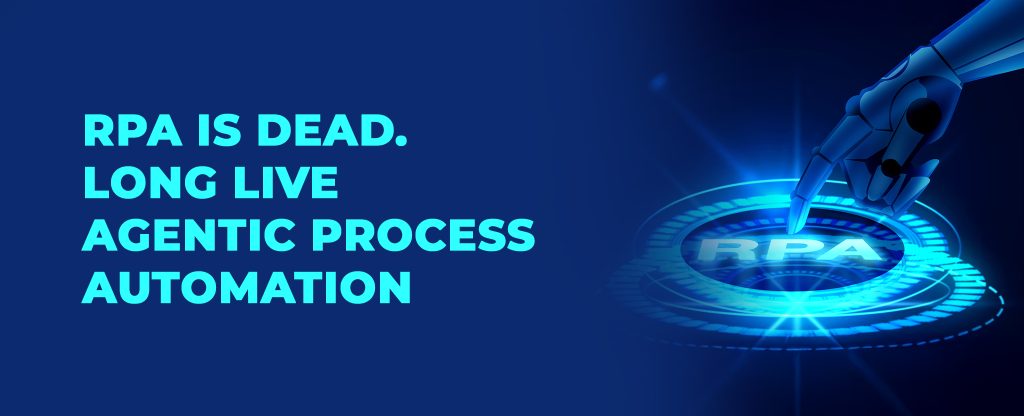RPA Is Dead. Long Live Agentic Process Automation
24 Oct 25 


The title “RPA Is Dead” doesn’t signal the demise of Robotic Process Automation—it marks its transformation. In 2025, we’re witnessing the evolution of RPA into Agentic Process Automation (APA), where AI-powered agents don’t just follow scripts, they think, adapt, and make intelligent decisions. For business leaders, this shift represents not just a technological upgrade, but a fundamental reimagining of how work gets done.
The RPA Revolution: Where We Started
Just five years ago, Robotic Process Automation seemed revolutionary. Organizations across industries deployed software bots to handle repetitive tasks—data entry, invoice processing, report generation—and saw immediate results. These digital workers didn’t need breaks, didn’t make typos, and could process thousands of transactions in the time it took a human to complete one.
The promise was compelling: reduce operational costs by 30-50%, eliminate human error, and free employees to focus on strategic work. Fortune 500 companies rushed to implement RPA solutions, and by 2023, the global RPA market had reached $13.7 billion.

But as organizations scaled their automation initiatives, they encountered a fundamental limitation: RPA bots are brilliant executors but terrible thinkers.
Also read The 10 Most Effective Digital Transformation Models Driving Business Success
The Limitations That Changed Everything
Despite its successes, traditional RPA began showing cracks under the pressure of modern business complexity. Here’s what IT leaders discovered:
The Five Critical Limitations of Traditional RPA
✅Maintenance Nightmare: Organizations discovered they were spending 40-60% of their automation budget just maintaining existing bots—not building new capabilities.
✅Brittleness: When a vendor updates their web interface, your bot breaks. Every UI change requires manual reprogramming, consuming IT resources.
✅Structured Data Dependency: RPA excels with standardized spreadsheets but fails spectacularly when faced with handwritten notes, email conversations, or unstructured documents.
✅Zero Adaptability: Encounter an exception to the rule? The bot stops dead, requiring human intervention every single time.
✅No Contextual Understanding: RPA follows instructions without comprehension. It can’t determine if a $1 million invoice is legitimate or a data entry error.
Enter Agentic Process Automation: The Intelligent Evolution
Agentic Process Automation represents a quantum leap in automation technology. Instead of following rigid scripts, APA systems employ AI agents—autonomous digital workers powered by large language models (LLMs), machine learning, and advanced decision-making algorithms.

RPA vs. APA: Understanding the Transformation

The Hybrid Future: Why RPA Isn’t Actually Dead
Here’s the truth that surprises many executives: Agentic Process Automation isn’t killing RPA—it’s elevating it.
The future of enterprise automation isn’t about choosing between RPA and APA. It’s about orchestrating them together in a hybrid model that leverages the strengths of both approaches.
When to Use RPA
- Perfect for: High-volume, predictable processes with structured data. Invoice processing, data migration, report generation, and system integrations where rules are clear and consistent.
- Why it works: RPA remains the most cost-effective and reliable solution for these scenarios. Why deploy expensive AI when simple automation suffices?
When to Deploy APA
- Perfect for: Complex, variable processes requiring judgment. Customer service inquiries, fraud detection, document understanding, strategic analysis, and scenarios where every case is unique.
- Why it works: AI agents handle the nuance, ambiguity, and complexity that would paralyze traditional bots.
The Orchestrated Approach
- Best practice: Use AI agents as the “brain” that makes decisions and handles complexity, while delegating routine, rules-based tasks to RPA bots for efficient execution.
- Result: An intelligent digital workforce where each component operates at its optimal capacity.
Industry Applications: Where APA Creates Maximum Impact
Financial Services
Use Case: Loan Application Processing
- AI agents review diverse documentation formats (pay stubs, bank statements, tax returns)
- Assess creditworthiness considering multiple variables and edge cases
- RPA bots handle standard verifications, credit checks, and document generation
- Result: 80% reduction in approval time, 95% accuracy, enhanced fraud detection
Healthcare
Use Case: Patient Care Coordination
- AI agents interpret doctor’s notes, test results, and patient histories to recommend care pathways
- Handle appointment scheduling conflicts, insurance pre-authorizations, and care team coordination
- RPA bots manage appointment confirmations, prescription refills, and billing updates
- Result: 60% reduction in administrative burden, improved patient outcomes, better resource allocation
Supply Chain & Logistics
Use Case: Dynamic Inventory Management
- AI agents predict demand fluctuations analyzing market trends, weather patterns, and social signals
- Make real-time decisions on reordering, redistribution, and supplier selection
- RPA bots execute purchase orders, update inventory systems, and generate shipping labels
- Result: 40% reduction in stockouts, 25% decrease in carrying costs, improved supplier relationships
Customer Service
Use Case: Intelligent Query Resolution
- AI agents understand customer intent from natural language queries across email, chat, and voice
- Provide personalized responses drawing from knowledge bases, previous interactions, and policy documents
- RPA bots handle account updates, refund processing, and system notifications
Result: 70% of queries resolved without human intervention, 90% customer satisfaction, 24/7 availability
Also read What Will E-Commerce Look Like in 2025?
Critical Success Factors: Lessons from the Field
Having guided numerous organizations through automation transformation, we’ve identified key factors that separate successful implementations from failed initiatives:
✅ What Successful Organizations Do Differently
- Start with Business Outcomes: They define clear business goals before selecting technology. Automation serves the business, not the other way around.
- Invest in Change Management: They recognize that 70% of automation success depends on people, not technology. They proactively address concerns, provide training, and celebrate wins.
- Think Hybrid from Day One: Rather than ripping out RPA, they build orchestrated frameworks that leverage multiple automation approaches strategically.
- Prioritize Data Quality: They understand that AI agents are only as good as the data they’re trained on. They invest in data governance and quality improvement.
- Measure Continuously: They establish clear KPIs from the start and track performance religiously, using data to drive continuous improvement.
- Partner with Experts: They work with experienced implementation partners who bring both technical expertise and business acumen to the table.
Conclusion: Embracing the Intelligent Automation Era
The declaration “RPA is dead” is deliberately provocative—because while RPA as a standalone solution has reached its limits, RPA as a component of intelligent, orchestrated automation is more relevant than ever. The future belongs to organizations that successfully blend the efficiency of RPA with the intelligence of agentic automation.
This isn’t just about technology. It’s about fundamentally reimagining how work gets done in your organization. It’s about creating a digital workforce that doesn’t just execute tasks but understands goals, adapts to changes, and drives continuous improvement.
For forward-thinking IT leaders and business executives, the question isn’t whether to adopt agentic automation—it’s how quickly you can implement it to gain competitive advantage.
At Mindster, we’ve helped organizations across the globe make this critical transition. With our 16+ years of experience in delivering cutting-edge digital solutions, we understand both the technical complexity and business implications of intelligent automation. Our team doesn’t just implement technology—we partner with you to design automation strategies that align with your business goals, culture, and growth trajectory.
Whether you’re taking your first steps into automation or looking to evolve your existing RPA infrastructure into an intelligent, agentic framework, Mindster brings the expertise, technology partnerships, and proven methodologies to ensure your success. Our mobile-first approach ensures your automation solutions work seamlessly across all platforms, empowering your workforce to manage intelligent processes from anywhere.
The automation revolution is here. The question is: will you lead it, or be disrupted by it?
- Agentic AI1
- Android Development3
- Artificial Intelligence38
- Autopay1
- Classified App3
- Custom App Development5
- Digital Transformation12
- Doctor Appointment Booking App14
- Dropshipping1
- Ecommerce Apps40
- Education Apps2
- Fintech-Apps38
- Fitness App4
- Flutter4
- Flutter Apps20
- Food Delivery App5
- Grocery App Development1
- Grocery Apps3
- Health Care10
- IoT2
- Loyalty Programs11
- Matrimony Apps1
- Microsoft1
- Mobile App Maintenance2
- Mobile Apps134
- On Demand Marketplace1
- Product Engineering6
- Progressive Web Apps1
- React Native Apps2
- Saas Application2
- Shopify9
- Software Development3
- Taxi Booking Apps7
- Truck Booking App5
- UI UX Design8
- Uncategorized7
- Web App Development1















Comments